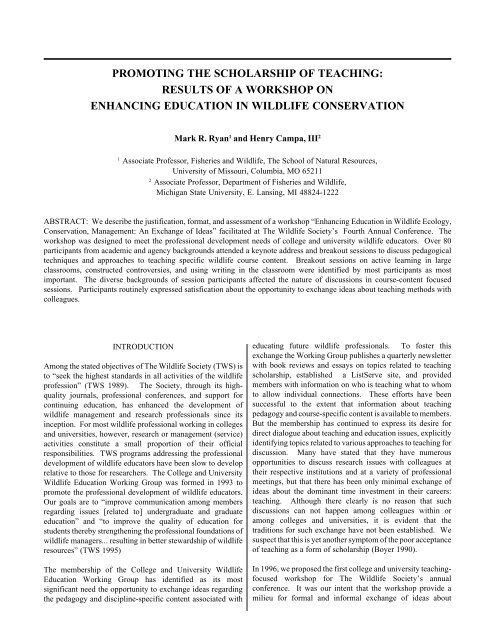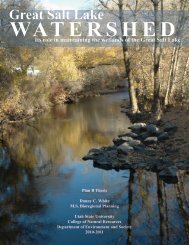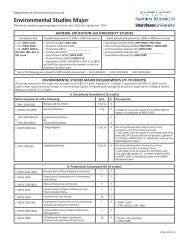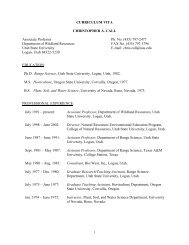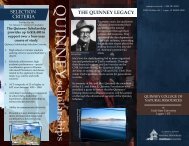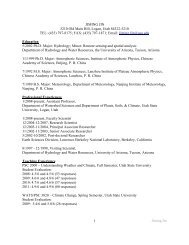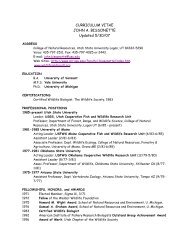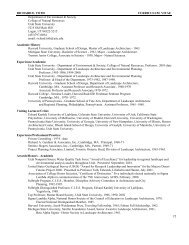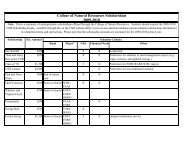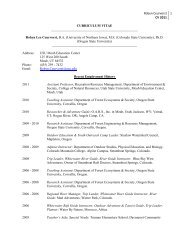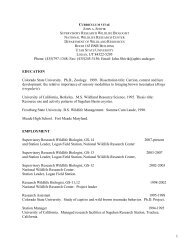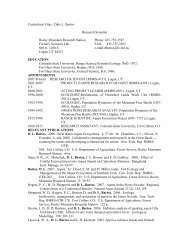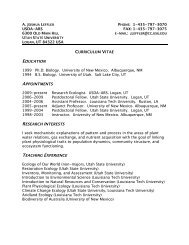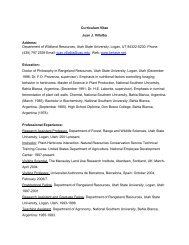University Education in Natural Resources - CNR Home - Utah State ...
University Education in Natural Resources - CNR Home - Utah State ...
University Education in Natural Resources - CNR Home - Utah State ...
Create successful ePaper yourself
Turn your PDF publications into a flip-book with our unique Google optimized e-Paper software.
PROMOTING THE SCHOLARSHIP OF TEACHING:<br />
RESULTS OF A WORKSHOP ON<br />
ENHANCING EDUCATION IN WILDLIFE CONSERVATION<br />
Mark R. Ryan 1 and Henry Campa, III 2<br />
1<br />
Associate Professor, Fisheries and Wildlife, The School of <strong>Natural</strong> <strong>Resources</strong>,<br />
<strong>University</strong> of Missouri, Columbia, MO 65211<br />
2<br />
Associate Professor, Department of Fisheries and Wildlife,<br />
Michigan <strong>State</strong> <strong>University</strong>, E. Lans<strong>in</strong>g, MI 48824-1222<br />
ABSTRACT: We describe the justification, format, and assessment of a workshop “Enhanc<strong>in</strong>g <strong>Education</strong> <strong>in</strong> Wildlife Ecology,<br />
Conservation, Management: An Exchange of Ideas” facilitated at The Wildlife Society’s Fourth Annual Conference. The<br />
workshop was designed to meet the professional development needs of college and university wildlife educators. Over 80<br />
participants from academic and agency backgrounds attended a keynote address and breakout sessions to discuss pedagogical<br />
techniques and approaches to teach<strong>in</strong>g specific wildlife course content. Breakout sessions on active learn<strong>in</strong>g <strong>in</strong> large<br />
classrooms, constructed controversies, and us<strong>in</strong>g writ<strong>in</strong>g <strong>in</strong> the classroom were identified by most participants as most<br />
important. The diverse backgrounds of session participants affected the nature of discussions <strong>in</strong> course-content focused<br />
sessions. Participants rout<strong>in</strong>ely expressed satisfication about the opportunity to exchange ideas about teach<strong>in</strong>g methods with<br />
colleagues.<br />
INTRODUCTION<br />
Among the stated objectives of The Wildlife Society (TWS) is<br />
to “seek the highest standards <strong>in</strong> all activities of the wildlife<br />
profession” (TWS 1989). The Society, through its highquality<br />
journals, professional conferences, and support for<br />
cont<strong>in</strong>u<strong>in</strong>g education, has enhanced the development of<br />
wildlife management and research professionals s<strong>in</strong>ce its<br />
<strong>in</strong>ception. For most wildlife professional work<strong>in</strong>g <strong>in</strong> colleges<br />
and universities, however, research or management (service)<br />
activities constitute a small proportion of their official<br />
responsibilities. TWS programs address<strong>in</strong>g the professional<br />
development of wildlife educators have been slow to develop<br />
relative to those for researchers. The College and <strong>University</strong><br />
Wildlife <strong>Education</strong> Work<strong>in</strong>g Group was formed <strong>in</strong> 1993 to<br />
promote the professional development of wildlife educators.<br />
Our goals are to “improve communication among members<br />
regard<strong>in</strong>g issues [related to] undergraduate and graduate<br />
education” and “to improve the quality of education for<br />
students thereby strengthen<strong>in</strong>g the professional foundations of<br />
wildlife managers... result<strong>in</strong>g <strong>in</strong> better stewardship of wildlife<br />
resources” (TWS 1995)<br />
The membership of the College and <strong>University</strong> Wildlife<br />
<strong>Education</strong> Work<strong>in</strong>g Group has identified as its most<br />
significant need the opportunity to exchange ideas regard<strong>in</strong>g<br />
the pedagogy and discipl<strong>in</strong>e-specific content associated with<br />
educat<strong>in</strong>g future wildlife professionals. To foster this<br />
exchange the Work<strong>in</strong>g Group publishes a quarterly newsletter<br />
with book reviews and essays on topics related to teach<strong>in</strong>g<br />
scholarship, established a ListServe site, and provided<br />
members with <strong>in</strong>formation on who is teach<strong>in</strong>g what to whom<br />
to allow <strong>in</strong>dividual connections. These efforts have been<br />
successful to the extent that <strong>in</strong>formation about teach<strong>in</strong>g<br />
pedagogy and course-specific content is available to members.<br />
But the membership has cont<strong>in</strong>ued to express its desire for<br />
direct dialogue about teach<strong>in</strong>g and education issues, explicitly<br />
identify<strong>in</strong>g topics related to various approaches to teach<strong>in</strong>g for<br />
discussion. Many have stated that they have numerous<br />
opportunities to discuss research issues with colleagues at<br />
their respective <strong>in</strong>stitutions and at a variety of professional<br />
meet<strong>in</strong>gs, but that there has been only m<strong>in</strong>imal exchange of<br />
ideas about the dom<strong>in</strong>ant time <strong>in</strong>vestment <strong>in</strong> their careers:<br />
teach<strong>in</strong>g. Although there clearly is no reason that such<br />
discussions can not happen among colleagues with<strong>in</strong> or<br />
among colleges and universities, it is evident that the<br />
traditions for such exchange have not been established. We<br />
suspect that this is yet another symptom of the poor acceptance<br />
of teach<strong>in</strong>g as a form of scholarship (Boyer 1990).<br />
In 1996, we proposed the first college and university teach<strong>in</strong>gfocused<br />
workshop for The Wildlife Society’s annual<br />
conference. It was our <strong>in</strong>tent that the workshop provide a<br />
milieu for formal and <strong>in</strong>formal exchange of ideas about


